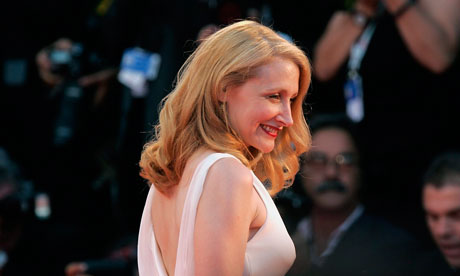
For more than 20 years, a piquant added pleasure in film-going has been waiting for Patricia Clarkson to turn up for a few scenes, or even more. It's a rare thing for her to coast or do anything other than suggest an untidy life in wild bloom behind her few lines. And not many actresses of any age can shift from amiable to crazed, or from kind to intimidating, so fast. So, in Lone Scherfig's One Day, we sigh with gratification when we realise that the hero's mother, dying of cancer and having to be carried to bed, is Clarkson. We are not let down; even in her crisis, this mother has the lemon gaze and the fond but astringent voice that can survey her son (Jim Sturgess) and let him know he's a bad lot who needs to try harder. More than that, she conveys the manageable sadness that her own marriage has taught her compromise.
It put me in mind of one of the first times I saw Clarkson, when she was Mrs Eliot Ness in Brian De Palma's The Untouchables (1987), being hurried out of Chicago so she could not be used as a hostage, or a victim. She was steadfast, radiant and deep enough to make you wonder whether Ness (the dour, dogged Kevin Costner) had made the best career move in seeking to rid Chicago of organised crime. Married life looked so much more tempting with Clarkson home at the end of the day.
Born in New Orleans, she can easily summon up southern smoke and romance, and she once did a famous Blanche in A Streetcar Named Desire at the Kennedy Centre. But her beauty bespoke tart intelligence and an active mind, so while she got movie parts they weren't always the big ones labeled "lovable" and "glamorous" or "bankable". So she was Catherine Ness for 10 minutes or so, and cast opposite Clint Eastwood in The Dead Pool (1988) (and Clint has a reputation for noticing the best sharp-faced blondes).
Soon enough, the picture business came to regard her as an eccentric and a supporting actor who was not content mouthing the stupid lines beautiful women are expected to believe in. So she took to enterprising parts on television series – in Frasier and Six Feet Under (she got two Emmys on that show) – and kept her witty, narrowed eyes on parts few others would risk. Perhaps the most notable of these was Greta, the addicted and very mannered refugee from the collapsed world of Rainer Werner Fassbinder in Lisa Cholodenko's High Art (1998). The element of comedy there never got in the way of the wounded humanity, and it was proof that Clarkson could handle contradictory impulses – another impediment to playing monolithic lead parts.
Inevitably, she became a darling of small, independent films in roles that had often been designed for her: the mother in chaos in Peter Hedges's Pieces of April (2003), which got her a supporting actress nomination; the divorcee in Thomas McCarthy's The Station Agent (2003). She was a nasty neighbour pretending to be sweet to Julianne Moore in Todd Haynes's Far from Heaven (2002); she was in Stanley Tucci's superb Joe Gould's Secret (2000); and was one of the highlights in the remake of All the King's Men (2006).
She has an honorable list of adventurous films: Frank Darabont's The Green Mile; Sean Penn's The Pledge; Dogville for Lars von Trier; fearful in George Clooney's Good Night, and Good Luck; Lars and the Real Girl; with Ben Kingsley in Isabelle Coixet's The Elegy; as the wife in Ira Sachs's Married Life (2007); standing up to younger company (Scarlett Johannson, Penélope Cruz and Rebecca Hall) in Woody Allen's Vicky Cristina Barcelona (2008); looking desperate in Scorsese's Shutter Island; and in Friends with Benefits.
Of course, Clarkson is in her 50s now, but I think she is established. The young people in movies need difficult relatives, sardonic role models, dying mothers and eloquent old crones. So she may easily last longer than many of the kids. She might even wander into a great witchy role, an old lady who shrugs off her years and starts to devour younger minds.

